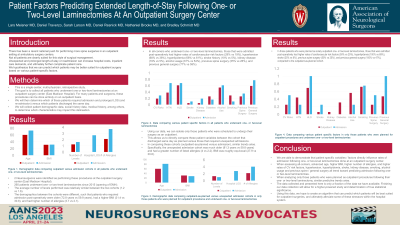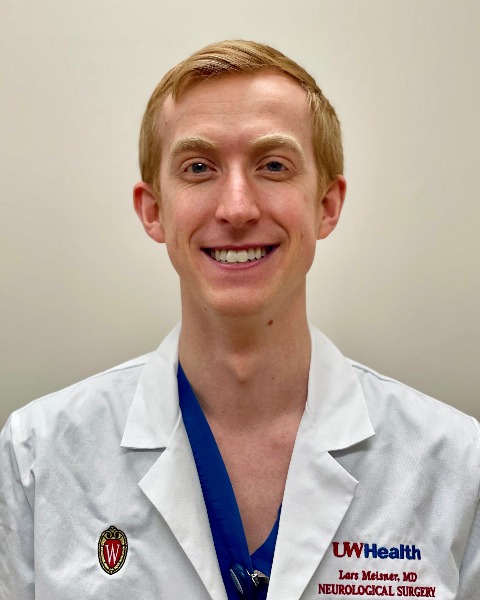Patient Factors Predicting Extended Length-of-Stay Following One or Two Level Lumbar Laminectomies At An Outpatient Surgery Center
Patient Factors Predicting Extended Length-of-stay Following One or Two Level Lumbar Laminectomies at an Outpatient Surgery Center
Friday, April 21, 2023


Lars Meisner, MD
Neurosurgery Resident
University of Wisconsin-Madison
Madison, Wisconsin, United States
ePoster Presenter(s)
Introduction: There has been a national push for performing spine surgeries in an outpatient setting. Not all patients are suited for this. Unexpected and prolonged length-of-stay (LOS) can increase hospital costs, inpatient care demands, and complicate patient care. We hypothesize that patient-specific factors may predict which patients may be best suited for outpatient surgery.
Methods: This is a single-center, multi-physician, retrospective study. We identified all patients who underwent one- or two-level laminectomies at an outpatient surgery center. We determined which of these patients required admission and prolonged LOS versus which patients discharged same-day. We collected patient specific data to determine which characteristics influenced this delineation.
Results: 260 patients were identified having undergone one- or two-level laminectomies. In all-comers who underwent these surgeries (whether they were planned outpatient or not), those that were admitted post-operatively were older (72.8 years vs 59.9 years), had higher BMI (31.4 vs 30.8), higher number of allergies (3.7 vs 2.1), and higher rates of cardiovascular risk factors (29% vs 19%), hypertension (68% vs 38%), hyperlipidemia (68% vs 61%), stroke history (10% vs 5%), kidney disease (19% vs 5%), alcohol usage (61% vs 54%), previous spine surgery (35% vs 26%), and previous general surgery (77% vs 59%). Isolating only those patients who were scheduled to undergo their surgery as an outpatient, similar trends arise. Those patients who were admitted unexpectedly post-operatively were older, had greater number of allergies, and had higher rates of cardiovascular risk factors, hyperlipidemia, stroke, previous spine surgery, and previous general surgery.
Conclusion : We demonstrate that patient-specific variables influence rates of admission following one- or two-level laminectomies. Using this data, we hope to create an algorithm that can predict which patients will be best-suited for outpatient surgery and alleviate stressors within the hospital.
Methods: This is a single-center, multi-physician, retrospective study. We identified all patients who underwent one- or two-level laminectomies at an outpatient surgery center. We determined which of these patients required admission and prolonged LOS versus which patients discharged same-day. We collected patient specific data to determine which characteristics influenced this delineation.
Results: 260 patients were identified having undergone one- or two-level laminectomies. In all-comers who underwent these surgeries (whether they were planned outpatient or not), those that were admitted post-operatively were older (72.8 years vs 59.9 years), had higher BMI (31.4 vs 30.8), higher number of allergies (3.7 vs 2.1), and higher rates of cardiovascular risk factors (29% vs 19%), hypertension (68% vs 38%), hyperlipidemia (68% vs 61%), stroke history (10% vs 5%), kidney disease (19% vs 5%), alcohol usage (61% vs 54%), previous spine surgery (35% vs 26%), and previous general surgery (77% vs 59%). Isolating only those patients who were scheduled to undergo their surgery as an outpatient, similar trends arise. Those patients who were admitted unexpectedly post-operatively were older, had greater number of allergies, and had higher rates of cardiovascular risk factors, hyperlipidemia, stroke, previous spine surgery, and previous general surgery.
Conclusion : We demonstrate that patient-specific variables influence rates of admission following one- or two-level laminectomies. Using this data, we hope to create an algorithm that can predict which patients will be best-suited for outpatient surgery and alleviate stressors within the hospital.
